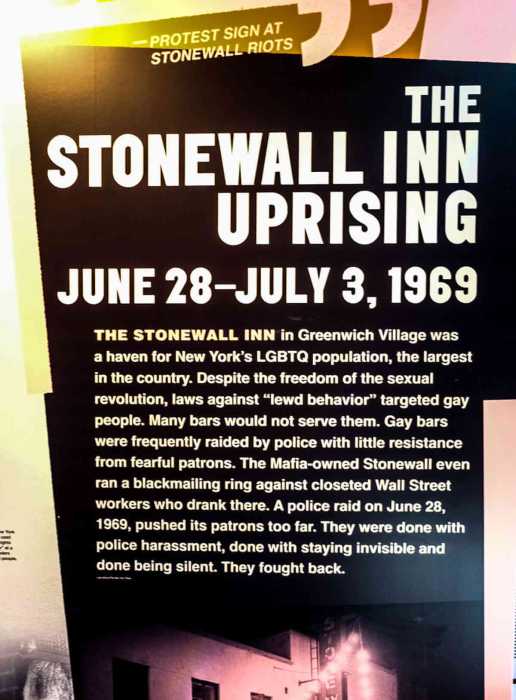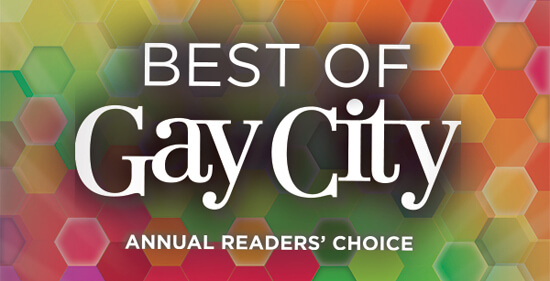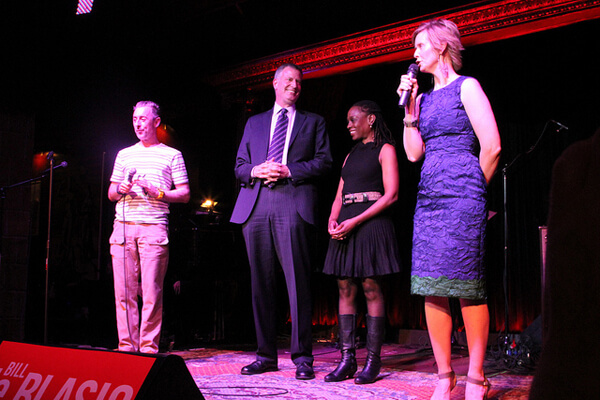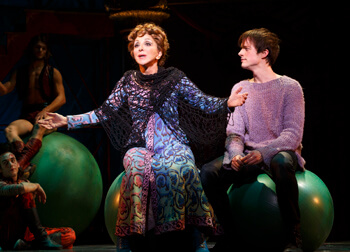Garret Dillahunt and Alan Cumming in Travis Fine’s “Any Day Now.” | MUSIC BOX FILMS
Based on a true story, “Any Day Now” has a plot that may sound like it belongs in a saccharine TV movie-of-the-week, but it proves to be a remarkably affecting film about a gay couple in 1979 Los Angeles involved in a custody battle. Rudy (Alan Cumming) is a drag queen who meets, mates, and then quickly moves in with Paul (Garret Dillahunt), a closeted lawyer. Rudy does this because he wants to be able to take care of Marco (Issac Levya), a teenage neighbor with Down syndrome who has been abandoned after his mother is arrested. While Paul obtains emergency legal custody of Marco, the couple soon face court appearances and, eventually, scrutiny of their queer lives.
“Any Day Now,” which has won numerous audience awards on the festival circuit, shows, without lecturing, just how hard obtaining legal rights was — and, in many places, continues to be — for same-sex couples. The film’s chronicle of justice will wring strong emotions from viewers, but does so in cogent and compelling ways that avoid the pitfalls of being didactic. There are also many poignant moments — from Rudy’s reaction to watching his “son” Marco sing at school to a heartbreaking letter Paul (in voice-over) reads in the film’s most powerful scene.
Cumming, whose acting is fantastic here, also gets to showcase his fabulous voice, especially in his moving cover of Bob Dylan’s “I Shall Be Released,” the song from which the film draws its title.
Gay City News spoke with the out gay Scottish actor about making “Any Day Now.”
GARY M. KRAMER: How did you make Rudy a character and not a caricature?
ALAN CUMMING: Obviously, some of the anxieties I had were about how to deal with things that could fall into stereotypes or be negative portrayals or cloying. I was conscious of that — much more than a straight actor would be. The part was originally more effeminate. But I fought to resist that. Any drag queen I know has balls of steel to walk down the street in wig and heels. I forgot Rudy is a drag queen. It’s a small part of the film, but he is performing in the initial scene. I was a drag queen with slightly hairy armpits — that was my concession. I wanted to be truthful and real. I wanted to be in the moment of the love story and not a distracting stereotype.
GMK: How did you work on your rapport with your co-stars Garret Dillahunt and Isaac Levya?
AC: I just really felt incredibly comfortable with Garret. When you have to do something like this — where we’re going to be making out and weeping — and realistically portray a thunderbolt love affair, we just dove right in. I met him at the wig fitting, and we shot two days later. We just really got on. There was never any awkwardness about the sex or lovey-dovey stuff. He’s easygoing and open and lovely, and easy on the eyes.
Isaac was just so lovely. He was excited to work with me, having seen me in “Spy Kids.” He was so excited to see Mr. Floop. I did fall in love with him. In a way, my relationship with Isaac mirrors what’s in the movie. My favorite thing about the experience was meeting Isaac. He was a ray of light.
GMK: How did you work on the songs Rudy sings as a performer in the film?
AC: It’s always a matter of which songs we have the rights to. And that changed all the time as we got nearer to shooting. What can we afford? But I thought that it was amazing that we got the Dylan song, a cri de coeur. The songs are more about what’s happening in the story — they have a thematic contribution. I love that the film ends with a song. It’s concluded by a performance; the song says more than any scene could. But it’s hard because you have to pre-record them. So you have to remember where the song came [in the film] so you know the feeling.
The day I had to perform it I was so exhausted. I was in a state of distress throughout making this film, but I really wanted to give it my all.
GMK: You did! It’s an incredible scene. Speaking of performing, what can you say about the drag scenes? Do you enjoy doing that or was it just part of the part?
AC: I dreaded those scenes! I did a thing for BBC where I played transgender, and I never want to see a high heel ever again. I was sore! I have respect for women — it’s like bondage. I don’t have an inner drag queen. It’s not my thing. Androgynous works for me.
GMK: What research did you do on custody issues — both past and present — for same-sex couples?
AC: I read a bit and talked to people, and over the years I have friends who have tried adopting, and the issues of adopting now through the state system are very hard as a gay couple. Your rights are vague.
GMK: What drives you as an advocate and activist?
AC: I don’t like injustice. I want equality. I’m Scottish and I grew up with a sense of fighting injustice — it’s almost genetic. As a gay man, I feel more and more angry. It’s easy to get lackadaisical. Even though great strides are made, we’re still second-class citizens.
GMK: Do you think you would make a good parent?
AC: Hah! I think so. I have two dogs, and that’s as far as it’s going to go. I was once obsessed about having a child. My novel [“Tommy’s Tale” from 2003] was a thinly veiled memoir about wanting to be a parent. But now — after all the guys I dated — I am with someone whom it would be sensible to have a kid with, and we’re content and don’t want to.
GMK: Do you prefer to play gay characters and tell gay stories?
AC: I feel a responsibility to take part in things that are meaningful and can change minds that need to be changed, but I don’t think, “Oh, I’ve not done my quota of gay characters.” Travis [Fine, the director] spoke to my manager and she really pushed me to read “Any Day Now.” And sometimes when you read something like this, you think: “That’s why you pay them!” Mostly, I’m drawn to things that are interesting and that I’m passionate about. A lot of the time they are gay, and I get asked to play gay characters because I don’t have an issue with it. Doing something like this, the passion and energy are more about how I feel than the actual role — what the film can do to open minds if more people see it.
GMK: The film concerns issues of justice. Do you think the world is just?
AC: [Laughs.] No! I don’t think the world is just. I think there are heartening things in the world, like Obama being reelected and states voting not to oppress gay people’s rights. But there is a long way to go, and I hate when they throw us a bone to think it’s all lovely. But we don’t have equality yet, and when that happens, it will be a more just place.
ANY DAY NOW | Directed by Travis Fine | Music Box Films | Opens Dec. 14 | Landmark Sunshine Cinema | 143 E. Houston St., btwn. First & Second Aves. | landmarktheatres.com | Elinor Bunin Film Center | Lincoln Center | 144 W. 65th St. | filmlinc.com



































